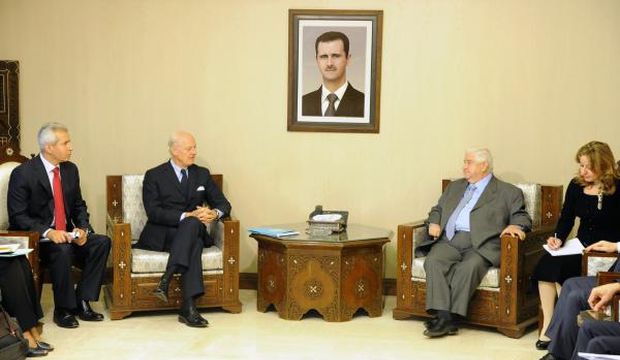
A handout picture provided by the Syrian Arab News Agency (SANA) shows Syrian Deputy Prime Minister and Foreign Minister Walid Al-Mouallem (C-R) meeting with United Nations special envoy for Syria Staffan de Mistura (C-L), during a brief visit in the Syrian capital Damascus on November 1, 2015. (AFP Photo/HO/ SANA)
London and Moscow, Asharq Al-Awsat—United Nations Envoy to Syria Staffan de Mistura met with Syrian Foreign Minister Walid Al-Mouallem on Sunday in Damascus in order to discuss the outcomes of international talks in Vienna last week aiming to find a solution to the crisis in Syria, a senior UN diplomat told Asharq Al-Awsat.
Syrian state news agency SANA reported that de Mistura provided Mouallem with a “detailed report” on the Vienna talks, which involved a number of countries including the United States, United Kingdom, Russia, Iran, Saudi Arabia, and Turkey, as well as the UN and EU.
In a joint statement on Friday following the meeting, the participants called for a “political process” to solve the crisis in Syria involving the government and the internationally recognized Syrian opposition, before new elections and a new constitution for the country.
The statement also said that terrorist groups with a presence in Syria, such as the Islamic State of Iraq and Syria (ISIS), “must be defeated” in order to bring about an end to the violence.
Following his meeting with de Mistura on Sunday, Mouallem expressed concerns regarding the statement and said he was “surprised” that it did not include “a commitment by known backers of terrorism” to stop supporting groups which the UN Security Council has deemed as terrorist organizations.
A major sticking point in the Vienna meetings was the question of President Bashar Al-Assad’s role in any future political solution for the country. Russia and Iran, the Syrian regime’s main backers, have long maintained that Assad must remain in power.
However, a source close to the Russian delegation at the meeting told Asharq Al-Awsat there had been some disagreements between the Russian and Iranian delegations in Vienna regarding the fate of Assad.
“Russia is dealing with the [question of] the fate of the presidency in Syria from the point of view of the legitimacy of the regime. In that sense it is not insisting on particular people; it is more concerned that any transition in governance must follow international protocols and laws,” the source, who requested anonymity because they were not authorized to speak to the media, said.
“Iran, on the other hand, is very insistent on Assad himself . . . because it fears losing its influence in Syria if [his] regime is removed.”
Meanwhile, the Syrian opposition will arrive on Wednesday in London for two-day talks with British Foreign Secretary Philip Hammond. The opposition delegation will include Khaled Khoja, the head of the main opposition umbrella group the Syrian National Coalition, as well as the Free Syrian Army’s (FSA) legal representative Osama Abu Zaid.
